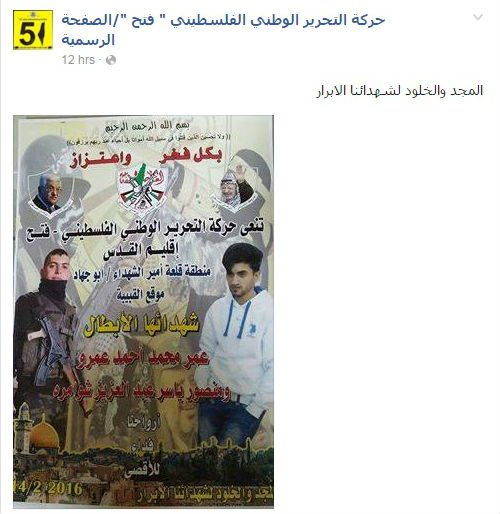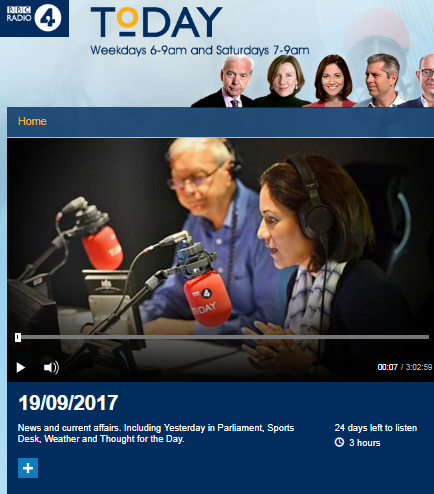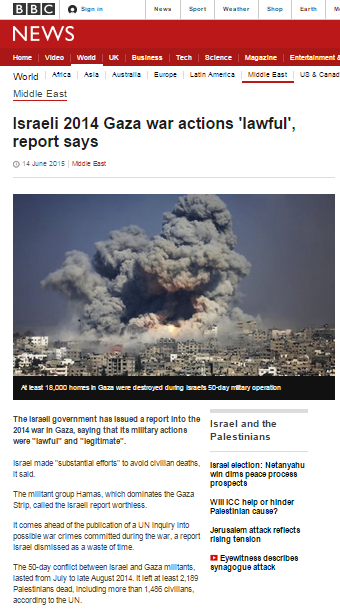On the evening of February 14th the BBC News website published an article about several terror attacks which took place on that day. The report was originally titled “Palestinian teenagers killed ‘after attacking Israelis'” with the punctuation employed clearly suggesting to audiences that there was room for doubt as to whether the people killed had really been in the process of carrying out attacks.
Later on – after an additional attack had taken place at Damascus Gate in Jerusalem – the headline was amended to read “Five Palestinians killed ‘after attacking Israelis’” – with the superfluous punctuation remaining in place.
The language employed in the report itself is no less ambiguous and the incidents are portrayed with ample use of the ‘Israel says’ caveat. [all emphasis added]
“Five Palestinians, three of them teenagers, have been shot dead after trying to attack Israeli security forces, Israeli officials say.
Another Palestinian, a teenage girl, was critically wounded in another attempted assault, police said.” […]
“More than 160 Palestinians – most of them attackers, Israel says – and 26 Israelis have been killed since October 2015.”
Oddly, on January 26th the BBC reported the number of Israelis killed in terror attacks since October as being 28 and on February 11th the number twenty-nine was used. The report goes on:
“In the first incident on Sunday, the Israeli army says that two boys were throwing rocks at passing cars near Jenin in the northern West Bank.
When a patrol arrived at the scene, the army says one of them opened fire with a rifle.
The soldiers fired back and killed the two Palestinians. Both are said to have been 15 years old.”
Even though photographs of the weapon used in that attack near Hinanit were available, the BBC still found it appropriate to qualify its portrayal of the story.
The second incident – at the Mazmoriya checkpoint – is described as follows:
“Later at a checkpoint, Israeli police say a Palestinian youth with a knife ran at officers as they checked cars entering Jerusalem. One officer opened fire and killed him.
The youth is said to have been 17 and from a village near Bethlehem.”
The third attack – at Damascus Gate – is portrayed thus:
“In the third deadly incident, two Palestinians were killed after they opened fire on Israeli police with automatic weapons outside Jerusalem’s Old City, an Israeli police spokesman said.”
Photographs of the weapons used in that attack (which later received praise from the PA president’s Fatah party) were also available. The BBC’s report has not been updated to inform audiences that – not for the first time – one of the terrorists was a member of the Palestinian Authority security forces.
A fourth incident which took place in Hebron on the same day is described as follows:
“In another incident, a 17-year-old woman who tried to stab a policeman in Hebron was shot and taken to hospital in a critical condition, police said.”
The caption to an image relating to that incident which is twice used to illustrate the article states:
“A knife and a purse at the scene of what Israel says was an attempted stabbing attack in Hebron”
The report then goes on to promote an alternative version of the story from unidentified “local” sources by amplifying and linking to a report from a Palestinian news agency.
“There were conflicting reports in Palestinian media, with the Maan news agency reporting that the shot girl had crossed a military checkpoint with her sister and was walking away when she was shot.
Maan quoted local Palestinian sources as saying neither girl had attempted an attack. The agency gave the dead girl’s age as 14 and said she had been fired on six times.”
In other words, the BBC opted for a ‘he said/she said’ portrayal of that incident rather than supplying audiences with verified, fact-based information. In light of the fact that the Ma’an news agency already has a record of promoting falsehoods about the circumstances of the deaths of Palestinians perpetrating terror attacks, one would of course have expected the BBC to independently confirm any claims put out by that agency before repeating them.
“In a video report accusing Israel of faking evidence of other knife attacks, a reporter for the Palestinian news agency Maan described the clip as evidence of “murder” and claimed in her narration that the video showed the boy lying on the ground when “an Israeli occupation soldier shoots him in the head,” which it does not.”
The BBC should of course by now be aware of the fact that Palestinian sources – including the PA itself – have in recent months often misrepresented the circumstances in which some of the perpetrators of terror attacks have been killed for the purposes of propaganda.
An organization which describes itself as “the standard-setter for international journalism” should surely be capable of providing its audiences with a fact-based portrayal of a story in its own words rather than making do with the presentation of conflicting reports, unnecessarily qualified statements and superfluous punctuation which – whilst it may perhaps be perceived as serving the purpose of ticking the ‘objectivity’ box – in fact results in readers being left to guess what actually happened and thus undermines the BBC’s remit of enhancing audience understanding of international issues.
Related Articles:
CAMERA Expert and Journalists Collide at Knesset Meeting
Wave of Palestinian Violence Accompanied by Spate of Bad Writing




